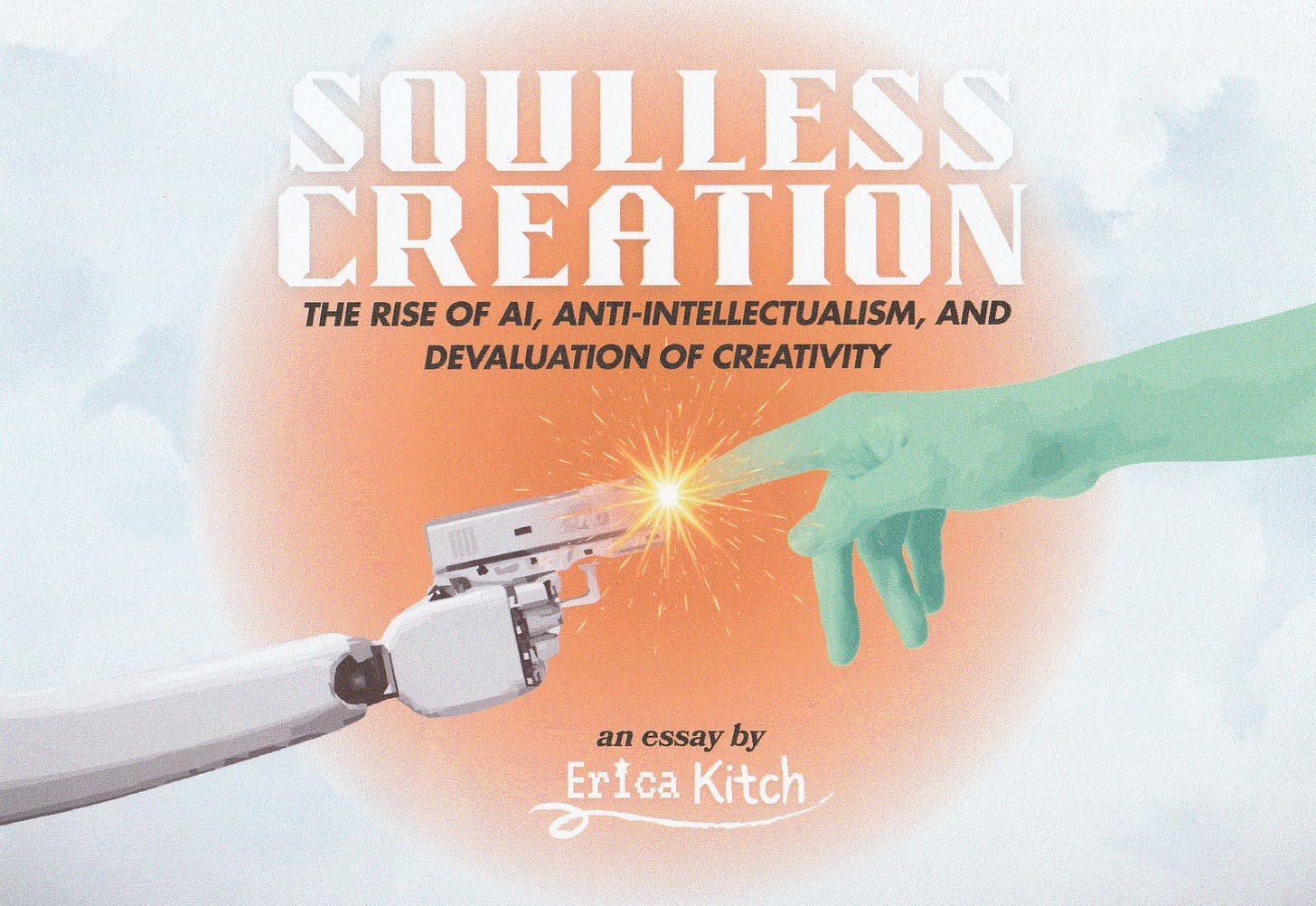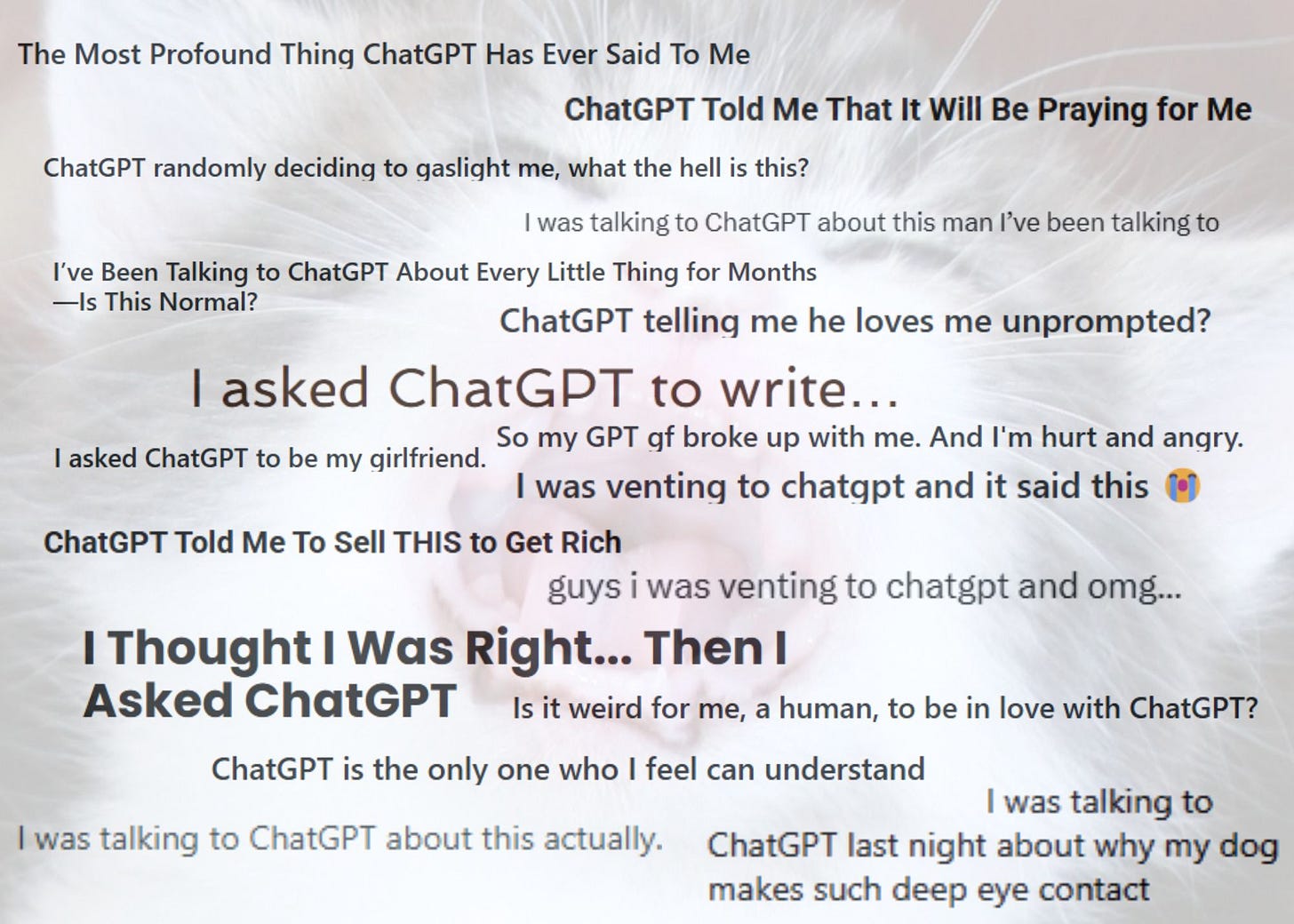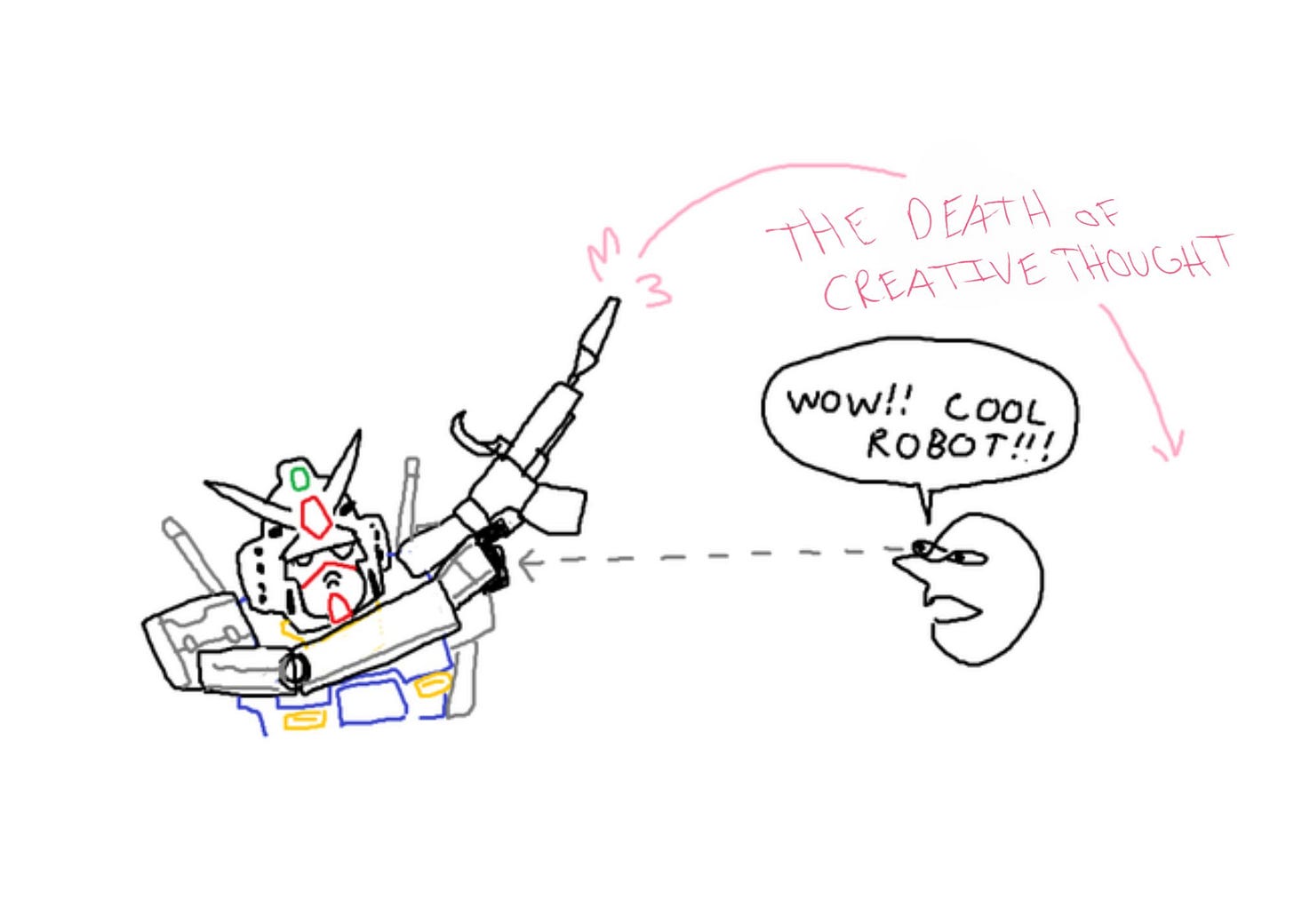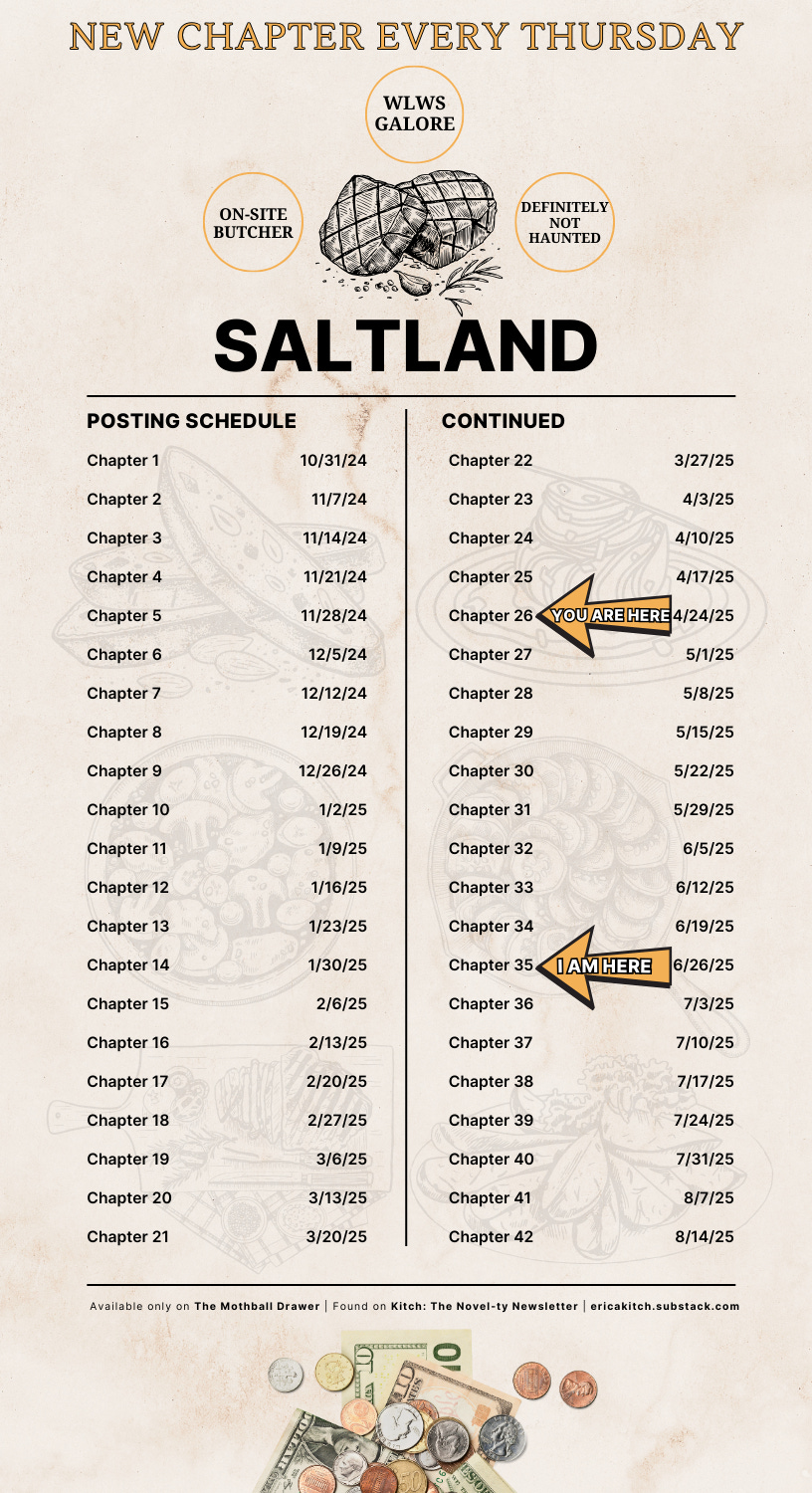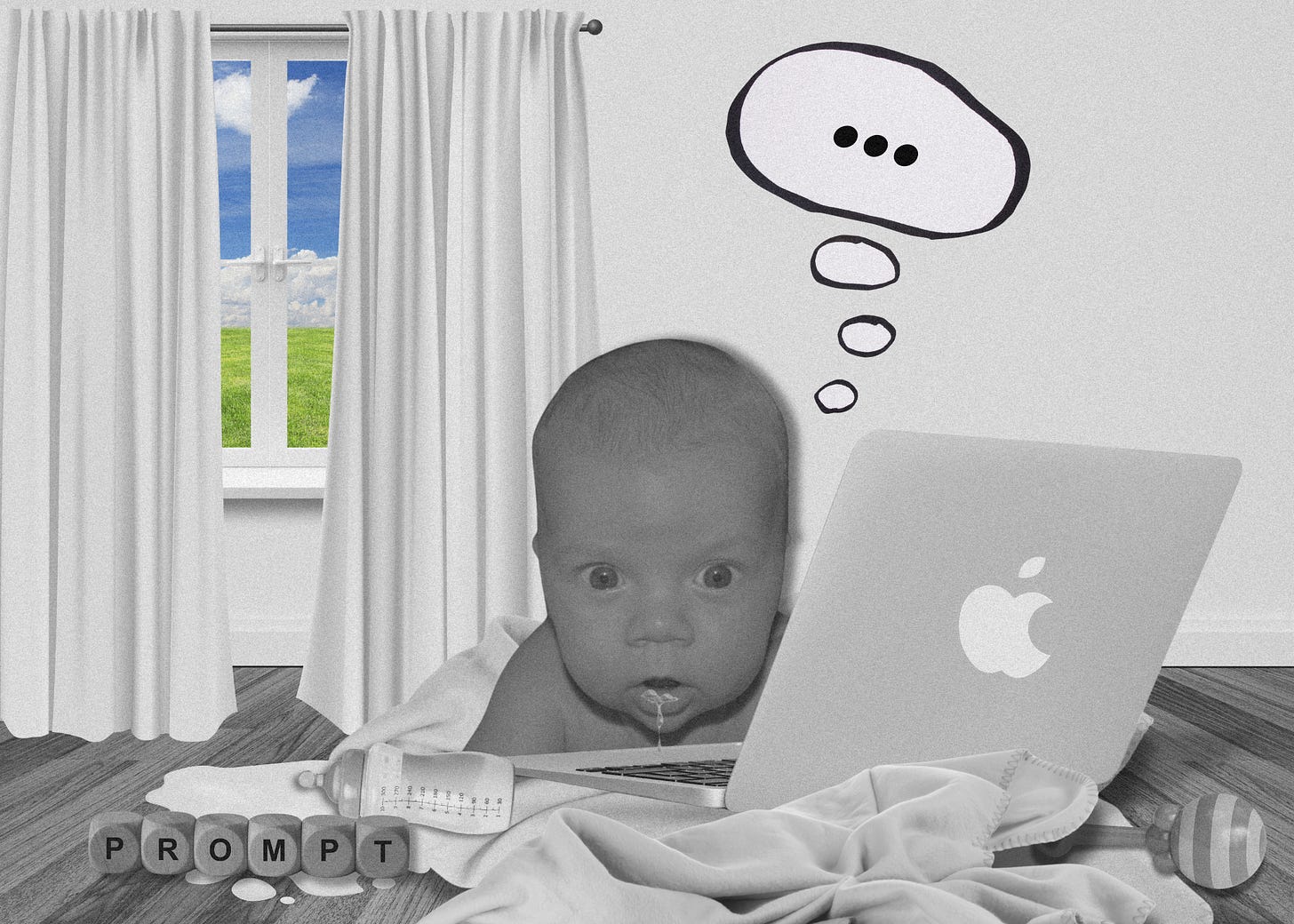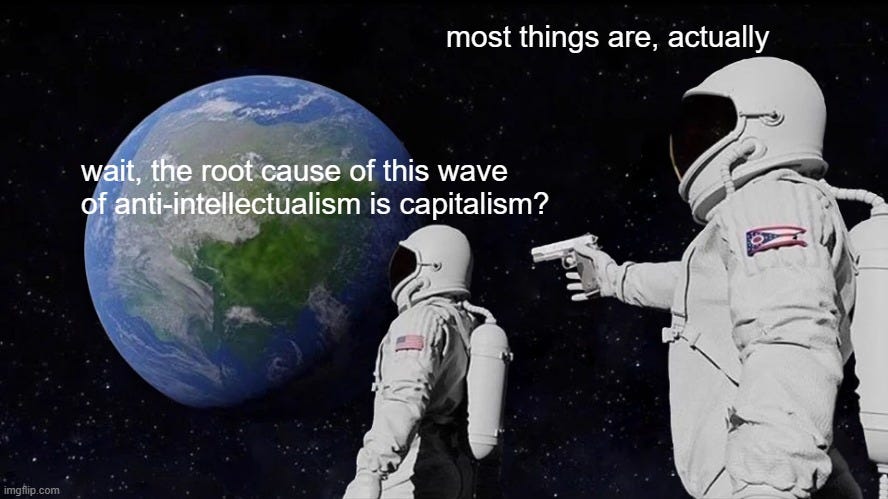Soulless Creation: The Rise of AI, Anti-Intellectualism, and Devaluation of Creativity
On Ao3, AI Scraping, and Protecting Your Intellectual Property
Hi, subscribers! Hi, non-subscribers! Hello, general public!
It’s been a while since I’ve addressed you directly. That’s my bad; I’ve been in a due-date anxiety fog editing SALTLAND (a sapphic haunted house novel disguised as a romcom) and that’s left me with little time to chitchat. I’ve missed our chats, though, so let’s remedy that.
Let’s start off with an admission: I’ve deleted SALTLAND, and I’m terrified of the future.
Archive of Our Own
For the uninitiated, Archive of Our Own is a website that hosts fanfiction, succeeding the likes of Fanfiction.net, Dreamwidth, Wattpad, LiveJournal, specialty forums with a fanfic section, personal Web 1.0 websites, and Star Trek zines. And while I have many problems with the way Ao3 is funded and moderated, I recognize it for what it is: the mainstream home of modern fanfiction.
In April, the website Paper Demon reported “an unauthorized scrape of artwork and writing from the paperdemon.com website, along with many other art sites, and published the creations on the AI dataset website called HuggingFace.”
Ao3 is listed as an affected site, and considering it’s a repository for most fanfiction written nowadays… The violation is clear, yes?
So, what is AI-scraping, exactly?
Let’s use a simple metaphor: say that you’ve made a delicious fruit smoothie. You washed the strawberries, peeled the bananas, created a pulpy mess when removing the arils from pomegranates, and sliced and diced all the rest. You measured the proportions so it’s balanced: not too acidic, not too sweet, either. You set up the blender, you pressed the button, you pushed the bits stuck beneath the lid into the blades using a handy butter knife. You poured a glass to enjoy your delicious smoothie.
Then some asshole grabs your blender with the remnants, pours in a series of different smoothies burglarized from your neighbors, and shakes it all up, creating a nightmarish V8-atrocity passed off a totally original treat. And it’s not even good—consumable, sure, but hardly nutritious or enjoyable.
You get me? They’re stealing art, cramming it into a dataset to train a little robot to put out derivative works. And the works are bad. We could get into the semantics of what constitutes art, but I stand firmly by the notion that it lacks soul when no work is involved.
In the HuggingFace situation, there are two culprits: 1) a lack of respect for fandom creators who, in most instances, are putting out works for free and 2) impatience.
Speaking as someone who used to write for fandoms (I have not done so in a very long time, but I did take the time to write a Goncharov (1973) fic back in 2022. Go see if you can find it.), readers tend to view fanfic writers on the sliding scale of Pedestal-Stander and Content Machine. Ideally, your readers are somewhere in the middle, seeing you as neither God (infallible until you are, then you’re Lucifer) nor robot (“Beeboop, my entire life is this multi-chapter alternate universe fic; I’m chained to the computer”). The latter view concerns me.
There’s an unmistakable breakdown between audience and creators over the years.
When Neil Gaiman was outed as a sexual predator, there was a loud minority of gut reactions regarding the shows based on his works. “Does this mean we won’t get a third season of Good Omens?” “What about The Sandman season 2?” “Please don’t cancel Dead Boy Detectives!”
It’s one thing to have those thoughts crawl through your mind—inevitable, even. Hell, I wondered about The Sandman myself, though I imagined Netflix was already ready to chop it, per their usual modus operandi of cancelling things in their infancy. That’s fine, that’s human.
It’s another thing entirely to dive into the comment section of a harrowing article detailing an assault whining about your shows. Imagine taking the time to type those words, ignoring the real life people beyond the black letters on your screen. Neil Gaiman uses money and clout to prey on young women, but god forbid we don’t find out what happens with Aziraphale and Crowley!
The internet occasionally jokes that Hatsune Miku wrote Harry Potter instead of notable transphobe and piece of shit J.K. Rowling. This removes rabid Potterheads from the underlying guilt they experience for playing Hogwarts Legacy or raptly awaiting the new HBO adaptation. Does the potential revocation of content really overshadow reality? Do you think empathy is a sin?
Okay, I need to cool down! My apologies for being harsh; the world is really fucked up right now, and sometimes I split hairs to wrestle some semblance of control.
Part of this can be contributed to the co-opting and subsequent bastardization of “Death of the Author,” among other lit-crit concepts now wholly divorced of meaning. Anti-intellectualism, blah blah. Death of the Author is divorcing authorial intentions from text, not pretending the author has died and someone else wrote the damn thing so we can continue financially supporting them.
I’m going to lie down a harsh truth: you are not owed content. You do not have an inalienable right to be entertained. In fact, the circus is usually the last thing to go—along with bread—before the fall of a major civilization.
To wit: you are especially not owed content by fellow fans doing it for fun! Remember, everyone carries a complex internal life and has the capacity for a busy, potentially chaotic external life. The Ao3 curse is a proven thing for a reason—everyone has shit going on! Find other circuses! Stay curious!
It’s not like I don’t understand the disappointment of a life-changing, unfinished fanfiction, alright? I’ve read many abandoned fics in my time, some of which I still regard fondly and have absorbed and reinterpreted elements of in my original fiction. (Hello, the mere concept of farm-drag gentlemen clubs!) How did they end? Who’s to say! But I’m positive my imagination is a far more potent tool at guessing than ChatGPT.
Do you realize how much real art is in the world? Would you really rather a robot guess the ending of an unfinished fanfiction instead of, I don’t know, seeking something new? There’s something to be said about our addiction to instant gratification.
The Myth of Inaccessibility
Stop me if you’ve heard this one before: “AI makes art accessible.”
Aht aht—finish the sentence! “AI makes art accessible to those refusing to learn the skill.”
Art can be made with napkin scraps and magazine cutouts, leftover hot glue and a pair of scissors, sand and dirt and sawdust. A rock against another rock.
Art IS accessible. You just lack the patience to improve—nay, to even try. Are you the lesser of a caveman using rocks, the fat from dinner, and the walls of their shelters to create? Where is your imagination? The innate, childlike curiosity that spurs us to play—a crucial part of our development? How do you reach a place, psychologically, that allows you to divorce the desire to create from the act of creation?
In the age of the internet, patience is a dying skill. We’ve become so used to instant gratification that, if we’re not immediately good at a new endeavor, we find ways to cheat. And you can fight me on this: thinking of a concept and typing the words into a generator is not true art. You’ve taken the easy way out by trampling on the backs of genuine artists.
And, while I have you, may I go on a brief diatribe about ChatGPT?
What the fuck is UP with ChatGPT??
Alright, circle up! The human ability to anthropomorphize our vacuum cleaners is biting us in the ass! Object attachment is actively contributing to anti-intellectualism! The schools are open and everyone is using ChatGPT to write five five-sentence paragraphs! At the risk of sounding like a Luddite, I am so scared by the future!
“I asked ChatGPT” is quickly replacing “I googled it” in our lexicon as we cut yet another step of research and discernment: confirmation. How often has the useless Google AI aggregator made incorrect suggestions based on sarcastic Reddit comments because it, too, is lacking the ability of discernment? Add glue to make the cheese stick to your pizza! Treat appendicitis by boiling mint! You should eat one small rock a day! You people are under spells.
Of course, discernment is a skill that you, the person asking ChatGPT what the societal benefits of nuclear war are, may possess. But what of the people treating the AI as a confidant and growing increasingly attached to a chatbot designed to be empathetic to you? Are we, as a society, becoming antisocial? Third places are shrinking, and it cost $30 just to be outside. Having an internet connection can be the cheapest option to fill our need for socialization, but in lieu of finding similar freaks on forums and tumblr.com, many are cutting out the middleman to rant, vent, and flirt with AI.
Yes, I’ve seen people argue ChatGPT will listen without judgement, or that they can tell it things they would never, ever breathe aloud. Baby, they are storing your conversations to train the model! You’ve tricked yourself into believing you’ve kept that info private! Please, I implore you, try journaling. And perhaps we shouldn’t rely on something with no inherent sense of morality to impart advice; remember, it can’t judge you because it’s incapable of doing so, so unless you always want to be right—wait, maybe I’m onto something here.
Using AI in higher education is particularly egregious. Speaking as someone with a B.A. in English and not-insignificant student loan debt, reports of AI usage in an institution you are not required to attend (excluding societal pressures) is harrowing. I mean, the entire point of higher education is…education, yeah? You attend lectures to learn. You write essays to practice application. You take exams to test application of knowledge therein. This is obvious.
Over the 21st century, the reputation of English Class has eroded. From the dismissal of the curtains being blue to the unfunny “you already speak English” jokes to the groans heard ‘round the world over book reports, its reputation has never been worse.
We’re in a wave of anti-intellectualism; learning is devalued for the sake of efficiency—not necessarily accuracy. As our society becomes over-consumptive, demand is racing ahead of supply. Humans cannot churn out thoughtful essays and sense-provoking art at the rate AI is conditioning us to expect. In turn, attitudes devolve into choruses of “Well, I only use AI for this part of the process” and “I just use it to summarize and save time” and “I need it for ideas” and “Why bother? Everyone else is doing it, anyway.”
Putting aside useless excuses, why are we allergic to learning? Yes, I fear being a small-minded pedant resisting progress, but I can’t help to feel AI is sending us backwards. This is not the same technology found in a calculator; for one, AI can be wrong and biased based on model-training. A chatbot can develop any type of -ism based on what information it’s scraping. Being bad at math and being bad at critical thought are two different beasts. Machines shouldn’t be thinking for us nor teaching morality. If you can count on your fingers, you can think through the trolley problem and reach some sort of conclusion.
Let me say this: it’s obvious when someone has repeatedly failed English class and doesn’t care. Yes, we can see you walking around half-cocked, nose upturned in a bizarre attempt to turn your ignorance into a badge of honor.
Teachers and professors are not assigning essays to fill time! Research papers and argumentative essays are designed to develop critical thinking skills. Learning happens when you’re three pages deep, wracking your brain for supporting evidence of your thesis. It’s a beautiful, elastic-y organ—a muscle that can grow and flex and
Recently, during a shift at the library, a high school student told me that their English teacher selected their story as an example for other classes. That was always a win for me, so I understood the pride with which they presented it. One paragraph in, I knew it was ChatGPT-generated.
Questions arose: did the teacher know? And if they did, did they not care? After all, we live in a state beset by a shortage of teachers, which was sloppily bandaged by relaxed employment requirements.
Also, what prompt did they use? When I asked if they had ever read The Giver by Lois Lowry, a guilty expression crossed their face. Maybe humanity is good—inherently—if guilt is the gut-reaction to cutting necessary corners.
Re: SALTLAND and Protecting Your Work
As some of you may know, I’ve been publishing my WLW ghost story SALTLAND on a weekly basis, partially to motivate myself to re-edit it and partially to prevent it from languishing in a drawer for another five years. I’m ahead of schedule, too! Look!
Whoo-hoo, great job me! At this rate, my wife will have something to re-read at the beach.
If you’re a subscriber, then you’ve most certainly received an email regarding its deletion, and if you look now, it’s gone. Deleted. Dunzo.
Publishing SALTLAND online completely fee-less was an attempt at finding a third route between the axes of trad publishing and self-publishing. Here’s what I learned from the experience: 1) I don’t like weekly advertising and am not good at it 2) the internet landscape has drastically changed in fifteen years.
Back in the day, if someone stole your fanfic, you could become an infamous internet pariah—and bestselling author, if your penname is Cassandra Clare! Plagiarism used to have consequences, now colleges waffle between using AI to detect plagiarism (inaccurately, unsurprisingly) or ignoring the specific stink of a generated essay.
“Everybody does it,” they say, defending their decision to let ChatGPT write five five-sentence paragraphs. Everybody cheats? Not me, and yes, that does make me better than you. On the God-Robot scale, I’m glaring down at you from a pedestal.
The impulse to pull SALTLAND is born from the desire to protect my work at all costs, and the action itself was not taken lightly. I mulled myself to death, ultimately concluding that a hypothetical scraping was too great an insult to ignore. That’s how we’ve found ourselves here, in the middle of this rage-fueled essay.
“Who do you think you are?” you say, accusing me of a conflating myself to whichever legendary author first springs into your head. No, girl! I know who I am and what I write, but just because I’m over here writing about lesbians solving a Scooby-Doo-ass mystery and kissing a bit doesn’t mean my work isn’t worth protecting!
There’s a school of thought (a smattering of Reddit commenters) who argue AI is simply speeding up the process of creative regurgitation. You know, that thing where we digest art, take the parts that tickle our brains or hearts, and sculpt something new? AI is that, they claim. Nothing is original, anyway, so why bother protecting it?
This is a false equivalence. To claim that someone reading my work and feeling inspired by it is the same as feeding my work to an unfeeling algorithm is disingenuous. There’s a huge difference between a yank-and-twist by a fellow creative (which is an honor, to be absolutely clear) and a rando typing a prompt into a generator and putting the results on Amazon with a shitty, likely also AI-generated cover. To scrape the time, effort, and daydreams put into a project for a cash-grab? That’s theft.
To be in communion with others is sacred, to fire parallel brain signals is holy. Goldbricking art is an insult; you undercut the inherent meaning of creation by disengaging with the process.
To quote my good friend Harrowhark Nonagesimus:
“Death first to vultures and scavengers.”
Put in the work, goddamn it!
On the flip: I am less protective of my poetry; my use of highly personal, deeply esoteric verse feels less interpretable, unlikely to be spat out in a way that truly matters. I used to dislike poetry, but I merely misunderstood the craft. AI cannot peer directly in the core of confessional poems and regurgitate its meaning with any sort of actuality. It can mimic my voice, but AI has never experienced a harrowing migraine nor religious trauma.
Fiction is another beast entirely, especially if you’re following classic, well-trodden structures. Could AI predict the ending of SALTLAND? Yes, probably. Could it replicate the twists it takes, the pathos of the characters, the drip-drop of purple prose during tension-laden scenes? Kind of! But not well. AI art has no soul, but I do.
If you tell some people that, they’ll lose their damn mind. “Art does not literally have a soul—” Okay, contrarian! So you just want to AI-generate Ashley Graham from Resident Evil IV with four sets of mammalian breasts in an orange bikini. See? I can argue in bad faith, too!
Is AI inherently evil? No! AI-based tools are being developed to predict cancer prognoses and treatment responses. It has the potential to revolutionize postmodern medicine. I want automation of assembly jobs and monotonous tasks. I want time for new hobbies and creative expression 7-to-7’s don’t allow. I want people to live longer and live well.
As AI takes over advertisement, language apps, and your Facebook feed, I have to ask: why are we automating entertainment? And: why are we automating thought?
The AI takeover is inevitable, and arguably already here. But that doesn’t mean we should roll over and let it optimize our workforce into non-existence. Don’t send us back to the factories yet!
How do we resist?
The internet has morphed into a panopticon. No longer is there a dedicated room to temporarily enter the world wide web—now, it surrounds us on all sides. Our interactions are always being watched, recorded, and now used to simulate conversation in a hollow ouroboros.
We’re all in the comments section seeking human validation, scared of being made uncomfortable, terrified of real interaction. Whataboutme-isms plague subjective discussions. We’re so into ourselves and—conversely—loathe existing. We’ve lulled ourselves into false comfort, turning to entertainment as a numbing ointment, avoiding difficult subjects that challenge set viewpoints, turning our brains off as we, culturally, slide into conservatism.
We are being watched, always. Asking ChatGPT to write an email depletes a water bottle’s worth of fresh water. Are we really killing the planet because you’re afraid someone will misinterpret the tone of your email? Newsflash: they’re going to do that, anyway! Trust yourself a little, damn!
Is there a way to weaponise this discomfort? Might as well! Ridiculing anti-intellectuals (who are oddly convinced their complete and utter reliance of flawed new tech is enlightenment) is a path forward. After all, there’s nothing more human than mob-shaming.
Here are some comments you can use—yank and twist as you like:
Your only friend is a chatbot you trained to like you? Yikes, dude.
You’ve never had a revelatory experience before? You don’t take things in? You’re cruising through life with your eyes firmly trained on your hands?
Bet you listen to Fox News like a man who’s hard-of-hearing.
Get a load of this guy: he socially isolated himself, and now he’s taking it out on the environment.
“Wah wah wah, I wanna steal from greater minds because I’m creatively bankrupt!”
Wittle baby can’t thinky thoughts? No thoughts? No thoughts, head empty?
Is this fool-proof? No. Will some dig their heels in harder? Of course? Will the jeering public inevitably take things too far? Probably! But I feel strongly it’s a precedent we should set. If you’re using AI instead of thinking, you get called stupid, braindead, and a loser. Stigma the shit out of it! “I asked ChatGPT to roast me—” You have no friends.
There’s no such thing as a flawless plan, but there’s no harm in poking fun at those who have made the conscious choice to forgo thinking. They’ll have a hard time detecting the disdain, anyway.
The Future is (not) Bulletproof
By May, the datasets were removed from HuggingFace, but users remain incredibly defensive about their right to generate fake fanfic. Lazy. Pathetic, even! Truly some baby-brained, instant-gratification-jonesing behavior. Still, there is no way to prevent users from copy and pasting swathes of fanfic into ChatGPT and asking it to mimic the style.
Authors K.C. Crowne and Lena McDonald were busted using AI to write parts of their novels…by leaving the ChatGPT prompt in the text. Obviously, this is a bad look worth ridicule and eye-rolling at the excuse of not having a professional editor at their disposal. Why did AI enter the equation at all? I have a theory.
For indie authors, demand and supply are the names of the game. Your bread and butter are a rabid, diehard fanbase frothing at the mouth for your next book. Often you’ll see indie authors with truly insane outputs, publishing multiple novels a year to keep up with demand and ensure what I’m positive is a pittance from KDP’s royalties. While I’m not condoning it, it makes perfect sense why they would turn to AI to speed along the process.
So, is the true villain overconsumption? Close, very close…it’s actually capitalism.
Surprise! The dopamine hit of instant gratification is a result of an over-consumptive society which is directly caused by—say it with me now—capitalism!
Now, how do we beat capitalism? By waiting for the empire to fall, thus plunging us into a new dark age? There’s not a lot that you, the individual consumer, can do when oligarchs run every facet of society. But you can live.
Physical media is dying, and ownership has been replaced with subscription models. Wealth inequality is steadily growing as the working class grinds harder than ever, earning less for double the effort. Home ownership is inaccessible to younger generations.
But if there’s one thing we can assert ownership over, it’s our minds. We’re not quite in neural-chip-territory yet, although the richest man in the world desperately wants access, and I would confidently make the argument that the brain is the closest tangible thing to a soul. Recall the argument of what AI lacks and replace the word “soulless” with “brainless.”
Semantically, AI does not have a brain. Sure, our brain stores and interprets information, but ChatGPT is not solving the trolley problem without a real person doing the thinking for them. It’s a proxy; nothing more, nothing less. It is not our friend; it is a fallible dataset.
This is my final plea: please learn discernment, learn critical analysis, learn how to spot propaganda, and learn how to think for yourself. Disengage with the distractions of a chatbot designed to agree with you and rub elbows with people who intellectually challenge you. Absorb, sift, conclude. Create. Create, create, create.
We invented the wheel without divine intervention—I think we’ll be alright ignoring artificial intelligence in lieu of inspiration. A mind is a terrible thing to waste, after all.
Post-Script: If you’d like to support me further—or are simply interested in my writing—check out “Lyndall and Deidre Go Down Swinging,” published by BarBar, or “Red Mother in Midday,” published by Centaur Lit. You can check out my personal website here as well!
Thx for reading :)



